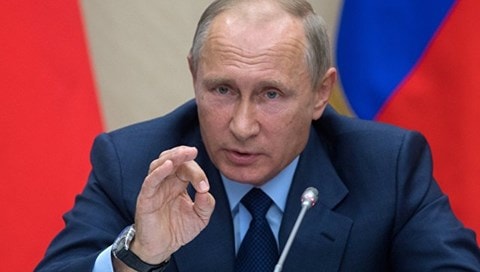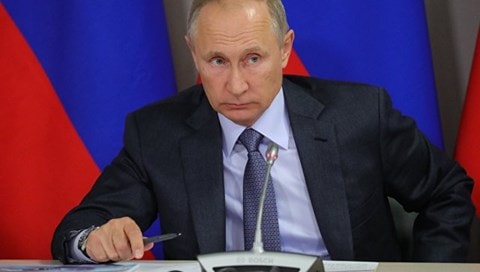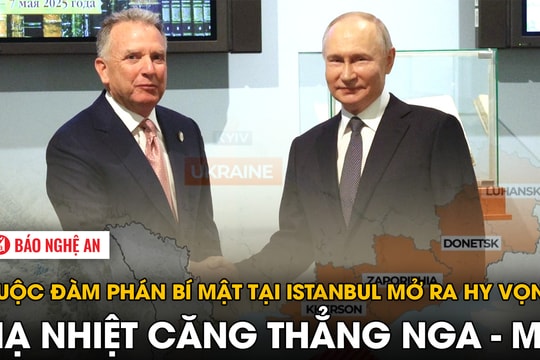What is special about Putin's third presidential term?
During his third term, President Putin has not only brought Russia back to being a world power, but also prepared a young leadership team to succeed him in the coming years.
 |
| Russian President Putin. |
In an interview with RIA Novosti, analysts said that President Vladimir Putin's third term took place under the conditions of having to solve geopolitical tasks and control the crisis, pushing the domestic political agenda aside, but it is the return to the country's internal development strategy that will become a major issue in 2018 and the following years.
Experts note that the top priorities for “in-house” issues are expressed in the continued rejuvenation of the board of governors, the development of the digital economy. All this, in short, is aimed at preparing the country not only for 2018, but also for the coming years.
On Saturday (October 7), Mr. Putin celebrated his 65th birthday. His third presidential term will end in the spring of 2018, which is also the time when Russia holds presidential elections (March 2018).
Current situation and results of the "Six-Year Plan"
Vladimir Slatinov, an expert at the Institute of Political-Humanitarian Studies, said that the final stage of Putin's third presidential term took place in a very different situation from what happened in the previous two terms.
"The president has been very consistent in turning towards solving geopolitical problems. For him, the protection of sovereignty has become the leading driving force of his activities, and I think that in this matter most of the efforts have gone in the right direction," the political scientist noted.
In Mr Slatinov's view, "Mr Putin wants this third term to be more devoted to implementing the May decrees, and raising living standards." "As for having to do something about the protests and restructuring the political system after the protests, I think this made a very strong impression on his character," the political scientist said.
On the other hand, the director of the Center for Political Information Alexei Mukhin noted that if not all was well with the "May decree", then in terms of economic significance it helped the country overcome a series of crises, which were aggravated by Western sanctions. "In this regard, of course, the President also has something to be proud of," the expert asserted.
He also agreed with Mr. Slatinov's view that, as head of government at that time, Mr. Putin had to deal with the 2008-2009 crisis, and although the situation in 2014 was qualitatively different, in principle, the President also fulfilled his responsibilities.
According to Mr. Mukhin, "Mr. Putin changes with each term," and he has accepted the new and modified the old. At the same time, the expert believes, the President can "have both a conservative and a liberal side in the same person." "The maintenance of the layers, which he demonstrated over his terms, on the one hand, contributed to the creation of a relatively stable political structure. But on the other hand, it is clear that at this time, at least during this term, the President has given priority to young professionals," Mr. Mukhin said.
The nature of the changes that have begun
Recently, many governor positions have changed. The President's press secretary, Dmitry Peskov, called the rotation of the governors a normal and expected process. According to RIA Novosti, a source close to the presidential administration revealed that the replacement of a series of regional leadership positions will be completed by October 10, with the President appointing about 8 to 11 new candidates for governor positions.
Mr Slatinov focuses on two points that led to the governors’ resignations and their significance. The first – the election – “the departure of unpopular and ineffective governors is a plus for the government’s candidate during the campaign”. The second point is that by appointing young managers, the Kremlin is counting on improving the efficiency of regional governance – a crucial element in its strategy to boost economic growth after the presidential election.
Expert Mukhin also pointed out, “this is an attempt to restart infrastructure projects in the regions”, to make them more attractive to local residents, which is what both Moscow and St. Petersburg have been striving for so far.
Director of the Center for Economic and Political Reforms Nikolai Mironov said that by rejuvenating the team of governors and developing the e-economy, the President was "trying to become a trend" in contrast to the first Russian President, Boris Yeltsin, to prepare "not only a successor for himself, but also a whole generation of people who can hold key positions in the state in a few years".
 |
| Russian President Putin |
After 2018
Mr. Slatinov believes that if Mr. Putin continues to win the presidential election, the most important task of the new term will shift to development "at a fairly significant pace."
The expert commented: "Three years of falling living standards... people are enduring reality, and the power rankings have not gone down. Due to the positive geopolitical situation, I can say, we have every right to declare our country a great power that has returned to the world chessboard. And to maintain and enhance military leadership and geopolitical role, it is necessary to develop the economy and raise the living standards of the people. And as I understand it, the President's task is to accelerate and return to the country's internal development strategy. The changes that have occurred in the Governor's team are related to that."
In any case, after 2018, the focus will shift from foreign policy to internal development, "but it cannot be separated from geopolitics," Slatinov noted. "From 2012 to 2014, Russia's reorientation in the active geopolitical game took place, and now in 2018 it is necessary to refocus priorities on domestic policy," the expert emphasized.
Mr. Mironov added that if Mr. Putin is a candidate in the upcoming elections and wins, then in the next six years, along with the President, "there will be a new team of young officials in the top positions." "In the long term, the successor of the President will be elected in 2024 or even earlier – early elections are not excluded. And this will probably be someone from the team of even younger people," - the expert concluded.
According to Infonet.vn
| RELATED NEWS |
|---|


